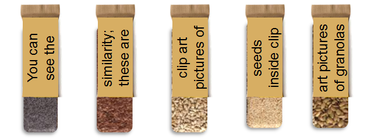|
Like the word Frisbee, the word for a granola came to us through a trademark. In 1886, Kellogg established the word as a proprietary name, which expired in the 1900s. When it was invented in 1863, the granola was actually written granula, but the famed cereal company switched things around slightly. Anyway, granula (and the similar word granular) obviously is an alteration of granules, which mean "small particles". Granule is from the Latin word granulum, a conjugated form of granum, which meant "grain" or "seed". This is from its Proto-Indo-European cognate and etymon, greno. We also get our current word grain from the Latin word granum, through Middle French grein and several alterations in Middle English that shifted from predominately greyn to predominately grayn and into our current form. Usage of the word grain is still more than a hundred times prevalent in literature than granola, which is also curious.
0 Comments
Your comment will be posted after it is approved.
Leave a Reply. |
AUTHORHello! I'm Adam Aleksic. I have a linguistics degree from Harvard University, where I co-founded the Harvard Undergraduate Linguistics Society and wrote my thesis on Serbo-Croatian language policy. In addition to etymology, I also really enjoy traveling, trivia, philosophy, board games, conlanging, and art history.
Archives
December 2023
TAGS |



